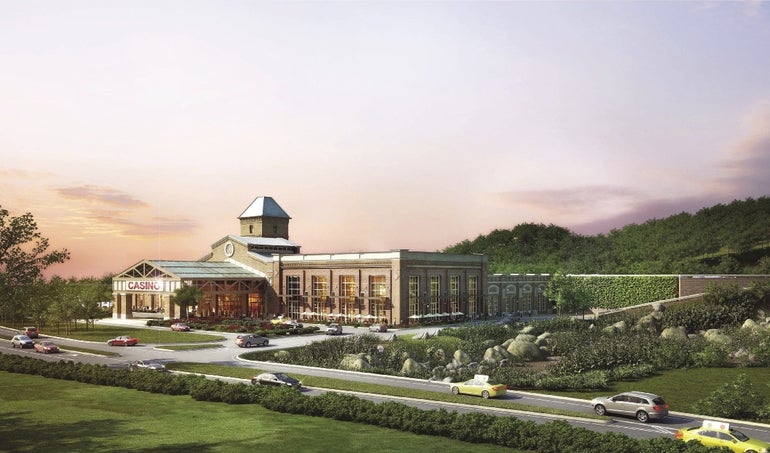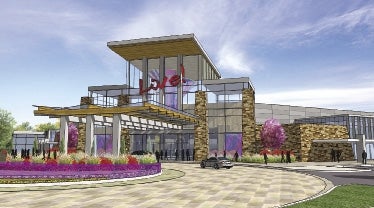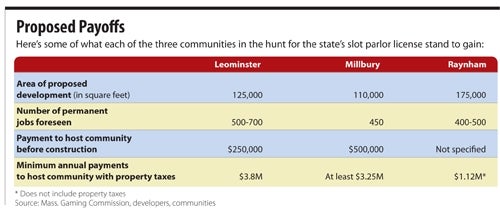Crunch Time For Slots Parlor Players
Community leaders in Millbury and Leominster who went to the negotiating table with slots parlor developers have largely been praised for what they came back with.
Even Brian Ashmankas — a Millbury selectman who is critical of the Mass Gaming & Entertainment (MGE) slots proposal for his town, and is leading a statewide push to repeal the two-year-old gaming expansion legislation — said he doesn’t think the agreement Town Manager Bob Spain signed with MGE is bad.
“I’m not going to argue the contract is a terrible contract,” he said. “They did a decent job negotiating it overall.”
After all, each of the three communities still in the hunt to claim the state’s lone slots parlor license — Millbury, Leominster and Raynham — stands to gain hundreds of jobs and millions of dollars, and other support from the casino developers courting their towns. Residents of Raynham were happy enough with the agreement negotiated for them that they overwhelmingly approved the slots parlor plan there last month. In Central Massachusetts, residents of Leominster and Millbury are still weighing the merits of the agreements before them and will go to the polls Sept. 24. The agreements that outline the terms of the deals between developers and the communities have many similarities, but also unique points.
Let’s Make A Deal
On paper, at least, the Leominster agreement appears the most monetarily beneficial of the three. It ensures the city will receive at least $3.8 million from PPE Casino Resorts, a subsidiary of Baltimore-based Cordish Cos., each year. PPE will also make a $250,000 grant payment to the city before construction starts at the 16-acre Jungle Road site. The company has said the project will create at least 600 construction jobs, with preference to be given to union workers, along with 500 to 700 permanent jobs, with preference to Leominster residents.
Meanwhile, Millbury’s agreement with MGE, a subsidiary of Chicago-based Rush Street Gaming, gives the town at least $3.25 million annually in payments from the company and a $500,000 grant prior to construction on 35 acres across from the Shoppes at Blackstone Valley mall. MGE expects to hire at least 450 permanent employees, yet that isn’t specified in the agreement. An estimated number of construction jobs hasn’t been mentioned.
“It’s just common sense you’re going to have jobs,” Spain, the town manager, said. “But to put a number on it, I don’t think anybody can. The key piece to me is not necessarily how many jobs, it’s the fact that Millbury residents get preference.”
However, he said he knows it will be difficult to enforce the requirement that MGE make a “good faith” effort to give residents preference, but that it makes sense for MGE to do so because it will want to maintain good relations with the town and the state gaming commission.
While the Leominster agreement directly addresses the number of jobs and preference to residents, David Cormier, the city councilor in Ward 3, where the slots parlor would be built, questions whether the language makes it similarly difficult to enforce.
“I don’t understand how you demand that somebody live up to that language in the agreement,” he said. “That’s something I’d have to ask: What are the guarantees and how do you enforce that?”
Cormier is also skeptical because PPE is a private entity investing in the city.
“They also have the right to have the best workforce doing their work that they can find, and it might not be in (our) community,” he said. “The idea of it is great; it makes sense. You want to boost your local economy, who wouldn’t? But the reality of it is you can’t always find the most qualified people right in your backyard.”
But Mayor Dean Mazzarella said jobs for residents are his No. 1 concern and he isn’t worried about whether PPE will follow through.
“That’s one thing I’m adamant about. (The residents) are very, very hardworking people and that should be taken into consideration. That’s something I won’t budge on at all,” he said.
PPE is already reaching out to the community by establishing an office on Sack Boulevard; a local business vendor fair is slated for Sept. 10 for those interested in working with PPE on the project.
Mazzarella said not everything should have to be in writing and that relationships need to be formed, so he isn’t worried about phrases like “in good faith.”
“So far, in our deals with them, everything’s been done in good faith,” he said.
In addition to questioning language in the agreements, there is criticism that the impacts of a slots parlor are unclear, as studies in Leominster and Millbury have yet to be completed.
“We haven’t done any studies,” Ashmankas, the Millbury selectman, said. “There (are) no impact studies whatsoever. We know there will be impacts, (but) we have no idea what that cost will be.”
Spain said the town is working on getting impact studies done before the vote. A traffic impact study has already been completed.
But Ashmankas isn’t sure the studies that are done before the vote will be enough.
“The concern in the end is if they’re to get that done soon — which is absolutely necessary — you can’t do a thorough job,” he said. He noted that Palmer took more than a year to complete its impact studies for the resort casino proposal by the owners of Mohegan Sun in Connecticut.
Leominster apparently has the same issue. Cormier wonders what the impact will be on the immediate neighborhood. He said the agreement doesn’t get specific with what PPE is proposing, although the company has said it would make an abutting condominium complex a gated community.
He also would have liked to see more specifics on the potential community impacts of the slots parlor in the agreement, particularly traffic.
“The money aspect is great, but after a while, when people really start to realize what problems there are, if there are any, then what are we going to do about it? We need to know that impact up front so people know this is what (they’re) bargaining for.”
He said that, as a city councilor, he isn’t strongly for or against the slots parlor, and can’t decide either way without first seeing impact studies.
After Mazzarella signed the host agreement with PPE in July, City Council President Susan Chalifoux Zephir asked for impact studies on traffic, local business revenue, demands on existing services such as water treatment, and property values to be done prior to the referendum.
Mazzarella said PPE is proceeding with the studies as quickly as it can and that the city will have peer reviews done, ideally before the vote. But he stressed that residents and elected officials already have an analysis of the area to review from when the much larger New England Development project off Jungle Road was being built about five years ago. That project includes 460,000 square feet of retail space with anchor tenants Wal-Mart and Lowe’s.
By comparison, the slots parlor, at 125,000 square feet, “is not a massive project,” Mazzarella said, and will draw less traffic than Wal-Mart.
He said voters will decide whether they approve of the Jungle Road location for a slots parlor in the referendum, but that voter approval won’t exempt PPE from typical city hurdles.
“At some point, they’re going to have to go into site plan approval, so this isn’t skipping anything,” Mazzarella said. He also noted that the agreement says PPE will be responsible for any necessary infrastructure upgrades and that the area would have a new storm drain system as part of the project.
Despite both communities lacking some specifics, both proposals have strong support, with Millbury even having an organized group of proponents. The Blackstone Valley Chamber of Commerce has also announced its support.
Up north, the North Central Massachusetts Chamber of Commerce has yet to take a position on the Leominster proposal. But President and CEO David McKeehan hasn’t seen strong opposition, except for some in the hospitality industry — particularly restaurateurs — who are concerned about how they would be affected.
“From a business standpoint, I would say the overwhelming opinion is, ‘Let’s see and let’s not get too excited,’ ” because the slots parlor isn’t in town yet, he said.
While proponents of both agreements are optimistic, McKeehan isn’t so sure either community will win the license.
“I’m not used to decisions that are being made in Boston being made in favor of Central Massachusetts,” he said, “So while I think (Cordish) has put a lot of thought into this proposal, I don’t think it’s a cinch.”
Read more
Plainville Site Out In Slots License Quest
Mass Gaming Unveils Millbury Slots Plan
Report: Mass. ‘Best Hope’ For Conn. Casinos Owners
Election Cycle Opens Door For Business To Raise Its Voice











0 Comments